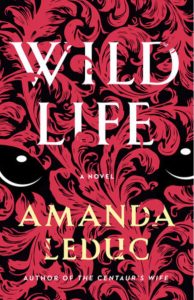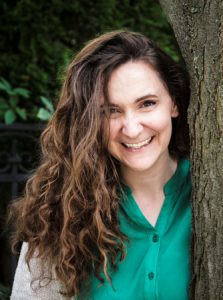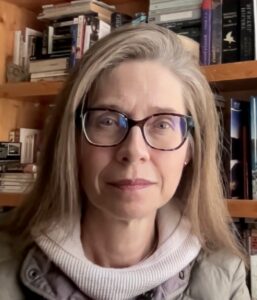Talking hyenas and beanstalks
Wild Life
by Amanda Leduc
Toronto: Random House Canada, 2025
$26.00 / 9780735272873
Reviewed by Dana McFarland
*

“‘You did not ask,’ the tallest hyena said. ‘But you are wild now regardless.’” —Wild Life, by Amanda Leduc
In fairy tales animals may be guides or helpers to humans, they may be indifferent, or they may work against human interests. From a human perspective, motivations of fairy tale animals may seem mysterious, their actions arbitrary or perhaps transactional: the queen bee identifies the right princess, birds come to the rescue of Cinderella, but they eat Hansel’s breadcrumb trail. Wolves terrorize and consume the innocent. In her 2021 novel, The Centaur’s Wife, BC-born Amanda Leduc explored complex human themes through the affordances of the fairy tale. In her new novel, she creates a generational saga that casts human interactions with increasingly sentient nonhumans as negotiated within a quality of “wildness” that defines each of us, whether through a humble embrace of it, willful appropriation and destructive action, or resistance and denial.
In the early twentieth century, a boy, Josiah, is curiously able to understand the speech of animals and consequently alienated from his practical farmer father: “God does not speak to us through animals.” As a young man, Josiah is sent by his father with missionaries from Scotland to Siberia, following a tragedy which breaks the family. Tragedy follows the mission also, and in the aftermath of a cataclysmic event, which fascinatingly entangles Biblical and historical events, a prophetic vision guides Josiah onward and homeward. The vision is accompanied by two talking spotted hyenas who save him from destruction: the Feral Disciples.

As with so many fairy tale agreements between species, the bargain between Josiah and the Feral Disciples is tenuous, and the hyenas come to see that Josiah’s subjective, human understanding is not adequate to partner with their own inscrutable sense of purpose: “there is a wild grief in him that he refuses to see…. We are whole because we are wild… maybe there are others, somewhere else, who will understand what I mean. We will find them.”
From this rift, the saga unfolds through a series of related stories over intervals of years, laddering down and out through Josiah’s relations, their descendants, and others connected to them. Characters navigate personal and social circumstances that cascade from Josiah’s actions and the consequent accelerating changes to natural and social order. Each in turn must negotiate their own understandings and existence in relation to wild creatures and their own wild nature, even as wild things are more and more emboldened to break their confinements, to seek their place and peace.
Leduc’s Wild Life is an intriguing addition to a body of novels that are grounded in the rich terroir of fairy tales, and it is more than that. The introduction of fantastical elements into contemporary and realistic settings will appeal to those who enjoy the capacity of magic realism to accentuate what might otherwise go unnoticed. Wild Life also finds a place among Canadian and regional works that de-centre human perspectives or challenge the primacy of human privilege, including Fifteen Dogs by Andre Alexis, The Dove in Bathurst Station by Patricia Westerhof, The Future by Catherine Leroux, Tanis MacDonald’s “FaunaWatch” project and essay, and the identically titled Wild Life by Molly Gloss. A striking entanglement occurs between Wild Life and Rebecca Campbell’s Arboreality (2022). In the closing pages of these novels, bones and tree limbs, respectively, are transformed into communal spaces where listeners may enter to hear wild music through the mediation of human artists and the trees that give life to their instruments.
In these times, when metaphorical leopards roam free to eat peoples’ faces—a meme never more timely— when it is too easy to supply examples of trusted institutions under attack or subverted, misinformation rampant, and malign actors empowered, the implications of denying or suborning the wild in us are clear and close. Amanda Leduc’s Wild Life may be appreciated for its intrinsic craft and beauty; it may be read also as meeting our historical moment, amplifying Mary Oliver’s newly resonant question: “Tell me, what is it you plan to do/with your one wild and precious life?”

*

Dana McFarland is a librarian at Vancouver Island University Library. She also works with the Community Scholars Program based at SFU, which connects eligible unaffiliated scholars in BC with academic library resources and services. She has worked with Royal Roads University, UBC, the Hul’qumi’num Treaty Group, and other library collaborative organizations. She lives in stz’uminus territory and keeps bees, when they agree to stay. [Editor’s note: Dana McFarland previously reviewed Julianne Harvey, Rebecca Campbell, and Susan Juby in BCR.]
*
The British Columbia Review
Interim Editors, 2023-26: Trevor Marc Hughes (non-fiction), Brett Josef Grubisic (fiction and poetry)
Publisher: Richard Mackie
Formerly The Ormsby Review, The British Columbia Review is an online book review and journal service for BC writers and readers. The Advisory Board now consists of Jean Barman, Wade Davis, Robin Fisher, Barry Gough, Hugh Johnston, Kathy Mezei, Patricia Roy, and Graeme Wynn. Provincial Government Patron (since September 2018): Creative BC. Honorary Patron: Yosef Wosk. Scholarly Patron: SFU Graduate Liberal Studies. The British Columbia Review was founded in 2016 by Richard Mackie and Alan Twigg.
“Only connect.” – E.M. Forster
2 comments on “Talking hyenas and beanstalks”